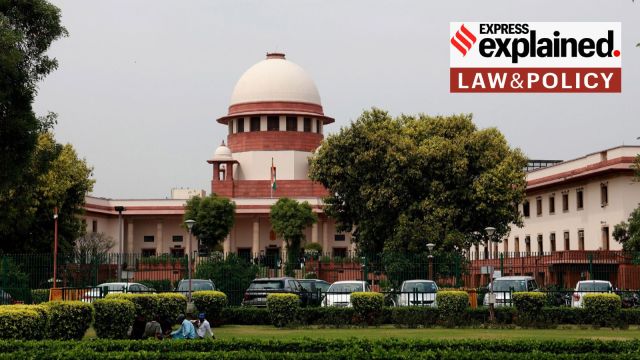Why multiple states will file a review against SC ruling on Teaching Eligibility Test
This intervention comes against the backdrop of years of demands from teachers’ bodies to either exempt in-service teachers from the test, or recognise long service as a substitute qualification, under the constitutional framework of Article 21A.
 On September 1, the Supreme Court declared that “the legal position emerging therefrom is clear: the TET is not a mere procedural requirement but forms an essential part of the minimum qualification criteria.”
On September 1, the Supreme Court declared that “the legal position emerging therefrom is clear: the TET is not a mere procedural requirement but forms an essential part of the minimum qualification criteria.”Multiple states have moved to file a review petition against the Supreme Court’s September 1 ruling, which makes the Teaching Eligibility Test (TET) a mandatory qualification for teachers in Classes I-VIII.
The two-judge bench, comprising Justice Dipankar Datta and Justice Manmohan, clarified the legal status of TET. The court declared that “the legal position emerging therefrom is clear: the TET is not a mere procedural requirement but forms an essential part of the minimum qualification criteria.”
Teachers’ associations, citing this ruling in communications to state governments, argue that the court’s decision to give the order retrospective effect will unsettle the careers of those already in service, many of whom were recruited long before the Right to Education (RTE) Act came into force. At present, the Governments of Kerala, Tamil Nadu, and Uttar Pradesh have said that they will consider filing a review petition in the SC.
This intervention comes against the backdrop of years of demands from teachers’ bodies to either exempt in-service teachers from the test, or recognise long service as a substitute qualification, under the constitutional framework of Article 21A.
What is TET?
The Teaching Eligibility Test came into force through Section 23 of the RTE Act, 2009, which authorises the central government to prescribe “minimum qualifications” for the appointment of teachers. In 2010, the National Council for Teacher Education (NCTE) was notified as the academic authority to frame these standards. The NCTE guidelines issued that year mandated that anyone seeking appointment as a teacher for Classes I–VIII must clear the TET.
The 2017 amendment to the RTE Act required all teachers without minimum qualifications as of March 31, 2015, to meet those standards within four years. The NCTE’s 2010 notification had already introduced the TET as a required qualification for teaching classes I to VIII.
The SC held that TET “is a constitutional necessity flowing from the right to quality education under Article 21A”. It further stated: “Compromising the quality of a teacher would necessarily compromise quality of education, and is a direct threat to the right of children to quality education which is a necessary concomitant of the right guaranteed by Article 21A.”
What was the case about?
The court was hearing petitions on two overlapping issues: whether TET qualifications apply to teachers in minority institutions, and whether in-service teachers recruited before the RTE Act are required to pass the test to retain their jobs or secure promotions.
On the minority question, the court referred the matter to a larger constitutional bench in light of the earlier Pramati ruling. But on TET, the bench ruled that the qualification applies across the board, including to in-service teachers seeking promotion.
The court ruled that Section 23 of the Right to Education Act requires teachers to pass the Teacher Eligibility Test (TET) not only for initial appointments but also for promotions. This means that in-service teachers seeking promotions must qualify in the TET, regardless of their years of service before the ruling.
Distinguishing between “recruitment” and “appointment”, the court said that recruitment is a broader process involving selection from both internal and external sources, while appointment refers to the final selection process. The court also clarified that qualification and eligibility are essentially the same, and possessing the required qualification makes a teacher eligible for appointment.
While acknowledging the challenges this ruling poses for long-serving teachers who were recruited before the RTE Act came into force, the court emphasised that statutory operation cannot be viewed as an injustice. These teachers will need to pass the TET if they wish to continue serving within five years of retirement or seek promotions.
Why did the court make the test mandatory?
The court carved out two categories of serving teachers. Those with less than five years left before retirement may continue until superannuation without passing TET, unless they seek promotion. But those with more than five years of service remaining must qualify within two years. “If any of such teachers fail to qualify the TET within the time that we have allowed, they shall have to quit service. They may be compulsorily retired and paid whatever terminal benefits they are entitled to,” the court ordered.
It further added a safeguard, “We add a rider that to qualify for the terminal benefits, such teachers must have put in the qualifying period of service, in accordance with the rules. If any teacher has not put in the qualifying service and there is some deficiency, his/her case may be considered by the appropriate department in the Government upon a representation being made by him/her.”
The Bombay High Court on September 11 addressed a case involving teachers who cleared the CTET in 2021, after the statutory cut-off of four years from March 2015. The HC held that teachers who qualified before the September 1, 2025, SC judgment can continue in service, while those who have not must obtain the qualification within two years. Based on this, the HC approved the petitioners’ transfer from unaided to aided schools and directed authorities to issue fresh orders.
Why has the judgment been criticised?
The apex court’s TET ruling has prompted reactions from teachers’ associations and state governments. Associations have requested review petitions, pointing out that teachers who have not cleared the TET are being denied promotions, while those who have qualified continue to move up.
On September 8, Kerala’s General Education Minister V. Sivankutty, in a press conference, urged the Union government to intervene in the matter. On September 11, the School Education Department of Tamil Nadu, in a press release, stated that, “the retrospective application of this requirement to teachers who are already in service has created grave concern.” Tamil Nadu further stressed that such a move would “create instability in the school system,” causing a shortage of teachers.
Uttar Pradesh Chief Minister Yogi Adityanath has asked the state Education Department to file a review petition, stressing the need to consider the experience of long-serving teachers.
In Delhi, the Government Schools Teachers Association wrote to Chief Minister Rekha Gupta on September 18, highlighting that teachers’ competence is already monitored through results, inspections, and performance reviews, and that requiring them to re-qualify adds pressure.
“Teaching is a profession that requires complete dedication to the students. Every teacher’s competence is already assessed through academic results, inspections, and performance reviews. To now compel teachers to re-qualify through Central TET is arbitrary and imposes undue psychological pressure on a workforce that is already performing its duties with commitment,” the letter read.
- 01
- 02
- 03
- 04
- 05






































